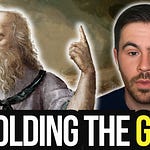“If you are distressed by anything external, the pain is not due to the thing itself, but to your estimate of it; and this you have the power to revoke at any moment.” ― Marcus Aurelius, Meditations
In CBT, a Cognitive Distortion is a fancy term for bad thinking. Or if you want to be really cynical about it, lying. We are constantly confronted with more information than we can handle in the world so we take mental shortcuts to get to grips with the complexity but often these mental shortcuts, have negative consequences for us, further down the line.
CBT is based on the ancient philosophy of Stoicism. The founder of CBT, Aaron T Beck, explicitly references the Stoics in his work, and the work of the Stoics can be summed up by the previous quote; thinking shapes our perception and by taking control of our thinking you can become a wiser and more virtuous person.
A cognitive distortion is a type of unproductive thinking that occurs when someone does something like Mind Reading. Mind Reading is essentially reflexively inferring what other people are thinking/feeling with little or no information to do so. We all know the story: Somebody is slightly off with you so you think: this must be XYZ, they think this, that and that and that's what going on! And without ever honestly asking them what is going on, you've made up a story, a theory, an explanation, and then probably get upset about it.
The story that you are applying to the event is so fused to the event itself that you end up confused, to become un-confused, then you need longer see the meaning you are attributing to the situation as a product of your own mind and separate it from reality. This can be a painful process however if you habitually do it, life can get a little less confusing.
These stories can also act as a self-fulfilling prophecy. For instance, you feel someone is off with you and you start to infer into this change in behaviour and tell a story, that you said something or did something that they didn't like when in reality, it’s something completely different. Now when you are interacting with them, you are thinking about what you could have done wrong! Rather than paying attention to them, and so they perceive that you are distracted and infer some other negative story into your behaviour and hey presto, drama occurs. And the entire circumstance was created by the story of the events that you were telling yourself.
CBT and Stoicism are about taking a philosophical pause and reflecting on our impulsive and uncontrolled judgements, on what we are telling ourselves in our mind, and pushing back and questioning those assumptions to get closer to the truth - In other words, paying attention to the meaning we ascribe to the event and doing the moral work, to unwind that meaning toward a more realistic judgement.
How To Stop Mind Reading.
First, identify what exactly it is you predict the other person is thinking. Sometimes just writing down or saying the prediction out loud can help you see the holes in logic, and get you a little distance from the unhelpful thought.
What are the costs and benefits of believing this thought? Although we usually don’t think about thoughts in terms of their costs and benefits, they all have costs and benefits. With mind reading, you may think that you are protecting yourself from some bad outcome, or some kind of a surprise. These would be benefits. Costs are things like increased anxiety, more self-consciousness, and ruminating. Now compare the potential benefits to the actual costs, and ask yourself, “Would you want to buy these thoughts given their price?”
What is the evidence for and against your thoughts? When we engage in a lot of mindreading, we usually only consider evidence that confirms our predictions. Rarely do we ever pit our assumptions against evidence that steers us away from our predictions. By collecting the evidence for and against our mind reading, you can determine which side has more evidence, and more importantly, consider the quality of the evidence you have. This is a more objective approach to testing your thoughts and can help you detect common cognitive distortions.
Can you test out the thought? What would need to happen for you to be absolutely convinced? Try it out as an experiment. Trying something new, and might get you a result you didn’t expect.
The True Aim of Stoicism and CBT.
“I know only one thing: that I know nothing.”
-Socrates.
There are 3 Maxims attributed to the Oracle of Delphi: ‘Know Thyself’, ‘Nothing in excess’ and ‘Certainty is insanity’.
The Oracle of Delphi was a pillar of wisdom in the ancient Greek world, who proclaimed Socrates was the wisest of all men and prompted his somewhat shocked statement above. However once Socrates heard this prophecy, he tried to prove the Oracle wrong and went to investigate other wise men. He quickly realised the other Wisemen know nothing either and that being aware he knew nothing was actually a strength! Because none of the other wise men knew anything either but they believed they knew things and hence suffered the evil of ‘double-ignorance’. In Socratic Ethics, all evil is the result of ignorance. People don’t willingly do evil, they simply mistake one good for the most important good and then bullshit themselves. The answer to the problem of self-deception, to lying to ourselves, is Socratic self-knowledge.
The goal of Stoicism is to become like Socrates, the ideal sage. In becoming like Socrates, the Stoic develops epistemic Humility and the ability to hold thoughts and judgements lightly. This doesn’t mean to become some sort of pushover! Socrates died for his convictions and could never be described as somebody like that, but he was deeply in love with pursuing the truth and re-discovering the truth, and wasn’t afraid to ask tough questions, which eventually lead to his death, which he faced very bravely.
To become like Socrates is a practice of paying attention to one’s thinking and judgements and correcting bad mental habits, like Mind-reading. Knowing the limits of your mind and inferences and separating the meaning from the event, appearance from reality and hence pursuing truth.
Stoicism and philosophy in general challenges us to catch ourselves in the act of falsifying reality and to make a moral effort to stop doing it out of love for the truth. You might be interested to know, that the term philosopher comes from the Greek ‘Philo-Sophia’ and means lover of wisdom, and that love is actually the primary motivational force for the philosopher. Addressing these questions honestly, is the start of an adventure, and all that might start, with simply asking better questions of yourself in your mind.












